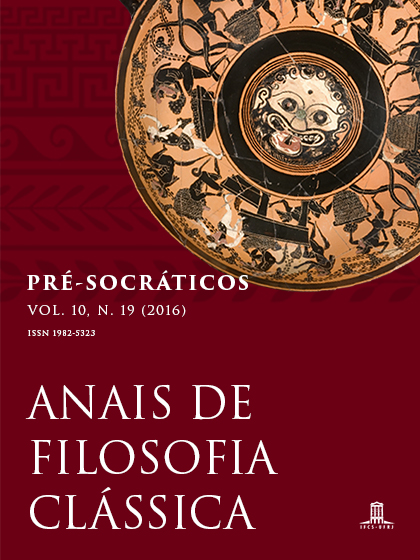Górgias e Eurípides, em torno de Helena e do trágico
DOI:
https://doi.org/10.47661/afcl.v10i19.4140Parole chiave:
Górgias, Eurípides, Helena, sofística, tragédiaAbstract
A partir da observação da personagem Helena em Górgias (Elogio de Helena) e Eurípides (Helena, As Troianas) é possível voltar à categoria do “trágico” e a pensá-la nos quadros da sofística, última figura do pensamento pré-socrático. Górgias confessa ao leitor que seu Elogio é um paígnion, um brinquedo, um jogo. E que ele rebate a um discurso difundido, falso e injusto, que condena Helena como adúltera. Também em Eurípides vemos um jogo antilógico. Se nas Troianas Menelau e Hécuba não deixam Helena desculpar sua parte de inteligência (noûs) pela evocação de todo seu fatídico, em Helena, Eurípides faz com que Helena nem vá a Troia, num estratagema de Hera, que envia uma imagem em seu lugar, de modo que ela permanece completamente inocente de adultério.
Downloads
Riferimenti bibliografici
ARISTOTELIS Ars Rhetorica. Recognovit brevique adnotatione critica instruxit: W. D. Ross. Oxford: Oxonii e Typographeo Clarendoniano, 1982.
DIELS-KRANZ Die Fragmente der Vorsokratiker. Zürich: Weidemannsche Verlagsbuchhandlung, 2004. 3 v.
EURIPIDE Hélène. Texte établi et traduit par Henri Grégoire. Paris: Les Belles Lettres, 2002.
Les Troyennes. Texte établi et traduit par Henri Grégoire et Léon Parmentier. Paris: Les Belles Lettres, 1925.
GERNET, L. Recherches sur le développement de la pensée juridique et morale en Grèce, Paris: Leroux, 1917.
GRUBE, G. M. A. The Drama of Euripides. London: Methuen, 1941.
KITTO, H. D. F. Greek Tragedy: A Literary Study. London: Methuen, 1950.
PIPPIN, A. N. Euripides' Helen: A Comedy of Ideas. In: Classical Philology, v. 55, n. 3, p. 151-163, 1960.
SAETTA-COTTONE, R. Ritmo, Parola, Immagine. Il teatro classico e la sua tradizione. In: La Biblioteca de Dionysus ex machina. A cura di Angela Maria Andrisano, 2011.
SAÃD, S. La faute tragique. Paris: Maspero, 1978.
SEIDENSTICKER, B. Comic Elements in Euripides' Bacchae, In: AJPh, XCIX 303-20, 1978.
Palintonos Harmonia, G¶ttingen, 1982.
UNTERSTEINER, M. Sofisti, testimonianze e frammenti. Firenze: La Nouva Itália, 1949-1962.


